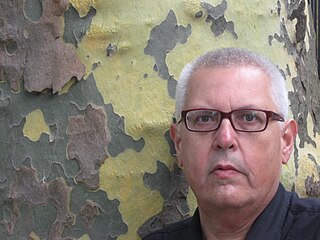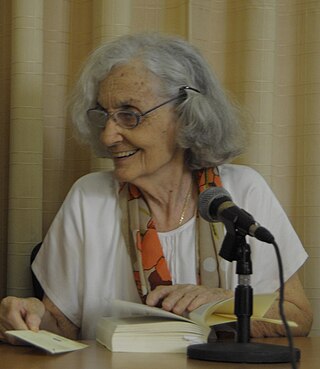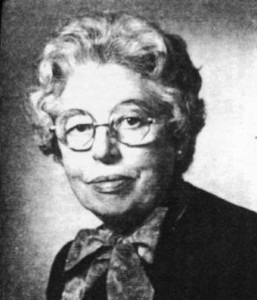
Odette Alonso (born 1964) is a poet, storyteller, essayist, and promoter of Cuban literature. She has a degree in philology. She currently lives in Mexico, where she has resided since 1992. [1]

Odette Alonso (born 1964) is a poet, storyteller, essayist, and promoter of Cuban literature. She has a degree in philology. She currently lives in Mexico, where she has resided since 1992. [1]
Odette was born in Santiago de Cuba in 1964. She is a member of the Network of Female Latin American Writers (Red de Escritoras Latinoamericas [RELAT]), the Writers' and Artists' Union of Cuba (Unión de Escritores y Artistas de Cuba), and the Union of Women Writers of the Antilles (Unión de Mujeres Escritoras de las Antillas [UMEDA]). Currently, she is an editor of the Dirección de Publicaciones of the Universidad Autónoma de México (UNAM).
She has published a book of short stories Con la boca abierta in Spain in 2006 and the novel Espejo de tres cuerpos in Mexico through Quimera Ediciones in 2009. She is the compiler of a poetry anthology called Las cuatro puntas del pañuelo. Her project "Poetas cubanos de la diáspora" won one of the prizes of the 2003 Cuban Artists Fund in New York City. It was published under the title Antología de la poesía cubana del exilio by Aduana Vieja Editorial in Valencia in 2011. [2]
Poetry collections

Ana Rosa Núñez was a Cuban-American poet and librarian. She authored over two dozen books of poetry, prose, and translations.

Zoé Valdés is a Cuban novelist, poet, scriptwriter, film director and blogger. She studied at the Instituto Superior Pedagógico Enrique José Varona, but did not graduate. From 1984 to 1988, she worked for the Delegación de Cuba at UNESCO in Paris and in the Oficina Cultural de la Misión de Cuba in Paris. From 1990 to 1995, she was an editor of the magazine Cine Cubano. She lives with her daughter in Paris. She has been married three times: with Cuban writer Manuel Pereira Quintero, Cuban government official José Antonio González and Cuban independent filmmaker Ricardo Vega.
Clara Janés Nadal, born in Barcelona, is a Spanish writer of several literary genres. She is recognised as a poet and is distinguished as a translator of different central European and eastern languages. Since 2015, she has occupied a seat in the Real Academia Española [1], becoming the tenth woman elected as a member of the RAE.
Cuban literature is the literature written in Cuba or outside the island by Cubans in Spanish language. It began to find its voice in the early 19th century. The major works published in Cuba during that time were of an abolitionist character. Notable writers of this genre include Gertrudis Gomez de Avellaneda and Cirilo Villaverde. Following the abolition of slavery in 1886, the focus of Cuban literature shifted. Dominant themes of independence and freedom were exemplified by José Martí, who led the modernista movement in Latin American literature. Writers such as the poet Nicolás Guillén focused on literature as social protest. Others, including Dulce María Loynaz, José Lezama Lima and Alejo Carpentier, dealt with more personal or universal issues. And a few more, such as Reinaldo Arenas and Guillermo Cabrera Infante, earned international recognition in the postrevolutionary era.

Natalia Toledo Paz is a Mexican poet who writes in Spanish and Zapotec. Her work helped to revive interest in the Zapotec language. Ida Kozlowska-Day states that Toledo is "one of the most recognized contemporary poets in the native languages of Mexico."

Angelina Muñiz-Huberman is a Mexican writer, academic, poet and professor. She is known for her work and research on Ladino, crypto-Judaism, Jewish mysticism and Sephardic Jews. Muñiz-Huberman is a recipient of the Xavier Villaurrutia Award and the Sor Juana Inés de la Cruz Prize. In 2022, she received an honorary doctorate from the National Autonomous University of Mexico (UNAM) for a lifetime's work, an honor she shares with such figures as John Dewey, Octavio Paz and Juan Rulfo.

Víctor Rodríguez Núñez is a Cuban poet, journalist, literary critic and translator.

David Mitrani Arenal is a Cuban writer, poet and researcher
Marilyn Bobes León is a Cuban poet, novelist, literary critic and editor.
Antonio Colinas Lobato is a Spanish writer and intellectual who was born in La Bañeza, León, Spain on January 30, 1946. He has published a variety of works, but is considered to be above all a poet. He won Spain's National Prize for Literature in 1982, among several other honors and awards.

René Vázquez Díaz is a Cuban-Swedish writer and translator, winner of the Radio France Internationale's Juan Rulfo Award 2007 for his novel Welcome to Miami Doctor Leal(Latin American Literary Review Press, Pittsburgh 2009). One of his most notable novels is The Island of Cundeamor. His latest published book is the autobiographical novel Ciudades junto al mar.
Juana Rosa Pita is a poet, writer, editor and translator. She was born in Havana on December 8, 1939. She left Cuba in 1961. Since then, she has lived in many cities, including Washington, Caracas, Madrid, New Orleans, Miami, and Boston, where she currently resides. From 1989 to 1992 she was Visiting Professor at Tulane University. She is considered one of the most important contemporary Cuban and Latin American poets. The late Nicaraguan poet Pablo Antonio Cuadra hailed her as "one of the outstanding voices of Cuba’s pilgrim culture. Book after book Juana Rosa Pita has been creating a mysterious realm of love and prophecy: an island of enchantment where words restore all that hatred turned to ashes."
Humberto López Cruz is a Cuban American writer. He earned a Ph.D. in Spanish at Florida State University. Currently, he is a professor of Spanish and Latin American Studies at the University of Central Florida, in Orlando. He has authored two poetry collections, Escorzo de un instante (2003) and Festinación (2012); his poems and other work have appeared in several publications in the United States, Spain, and Panamá. He has authored and/or edited several books on literary criticism. In addition, his articles have been published in respected academic journals, as well as in book chapters in accredited series, in the United States, Panama, Costa Rica, Mexico, Nicaragua, Guatemala, Puerto Rico, and Spain.

Mirta Gloria Yáñez Quiñoa is a Cuban philologist, teacher and writer. She graduated from high school in Raúl Cepero Bonilla Special Pre-university Institute where she was considered a high-performing student. She entered the University of Havana in 1965, graduating five years later. She earned a PhD in philology (1992) at the same university, specializing in Latin American and Cuban literature, as well as in studies on Cuban women's literary discourse. She worked for many years teaching and conducting research at the University of Havana.

Josefina García-Marruz Badía, known artistically as Fina García Marruz, was a Cuban poet and literary researcher.
Aurora Luque Ortiz is a Spanish poet, translator, teacher, and writer based in Andalusia.

Julia Pérez Montes de Oca was a Cuban poet, sister of the poet Luisa Pérez de Zambrana.

Luis Aguilar Martínez was a Mexican poet, essayist, narrator, and translator. He was the author of Debe ser ya noviembre, Muchachos que no besan en la boca, Libre de sospecha: Antología boreal and Los ojos ya deshechos, among other books.

María Concepción Zardoya González, also known as Concha Zardoya, was a Chilean poet and literary critic. During her career, she published nearly 40 poetry collections and won multiple literary awards.

Claudia Salazar Jiménez is a Peruvian writer, editor, academic and a cultural manager. Her first novel Blood of the Dawn, set in Peru during the times of internal unrest in the 1980s, was awarded Premio Las Américas.